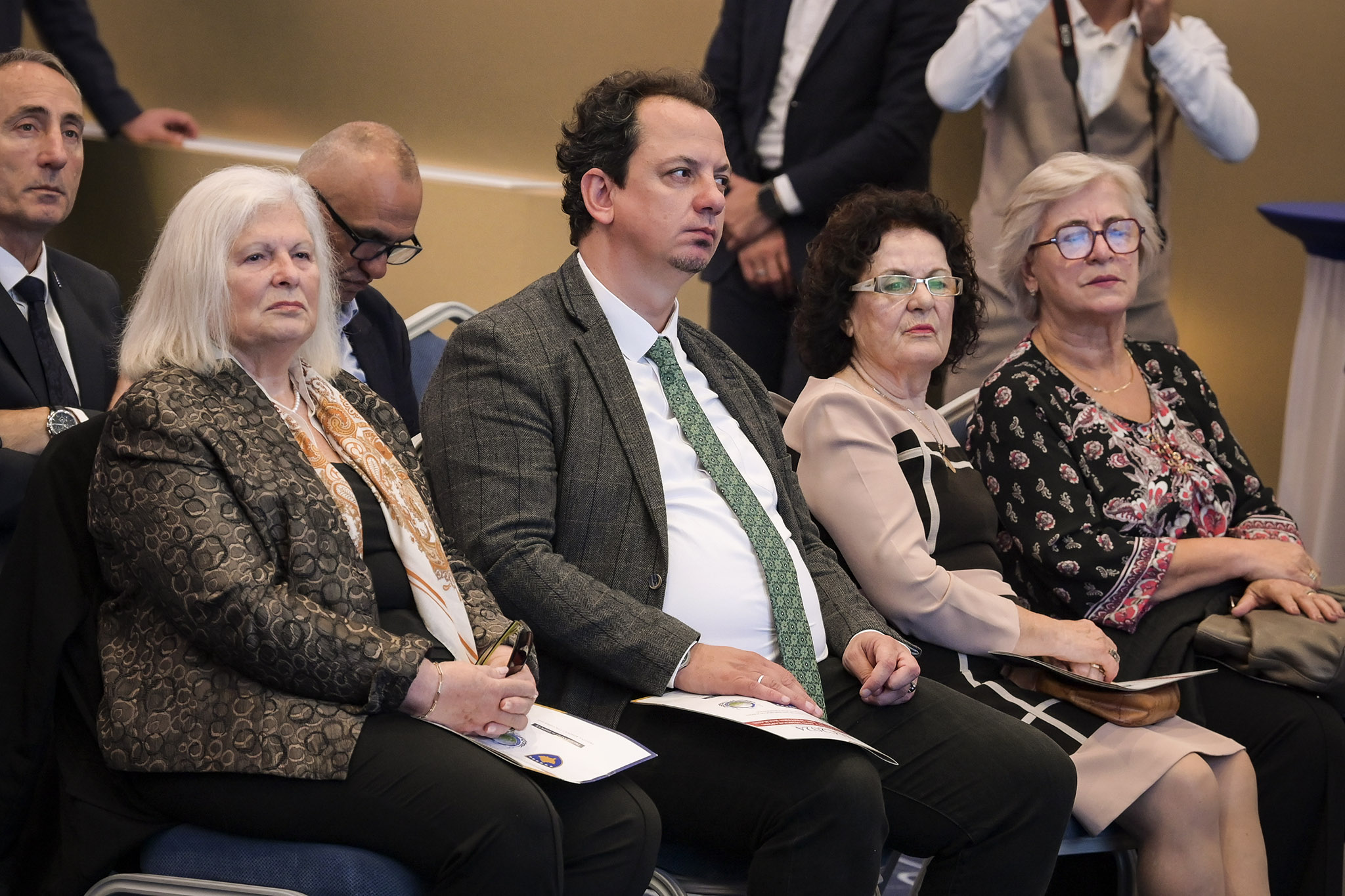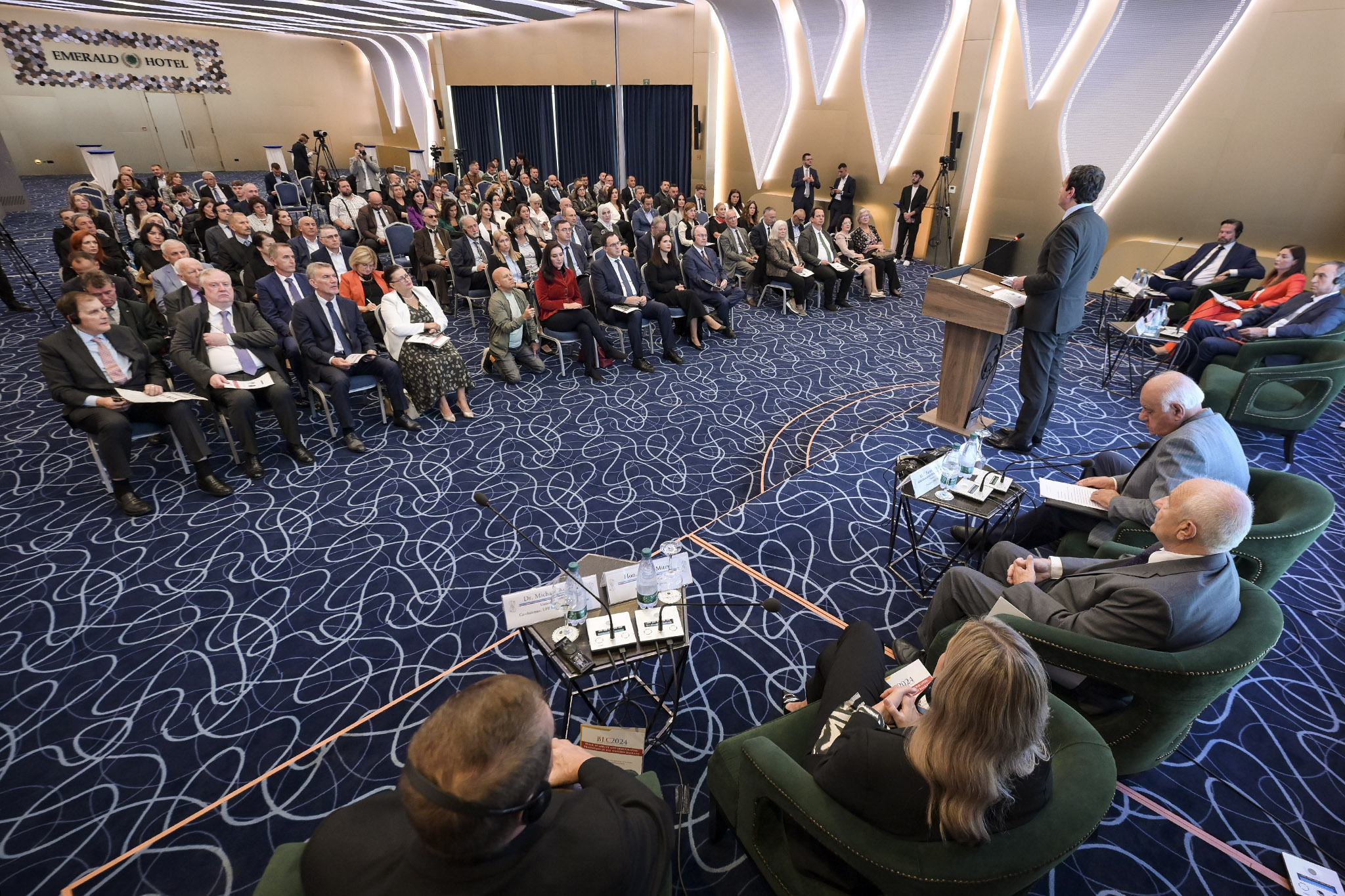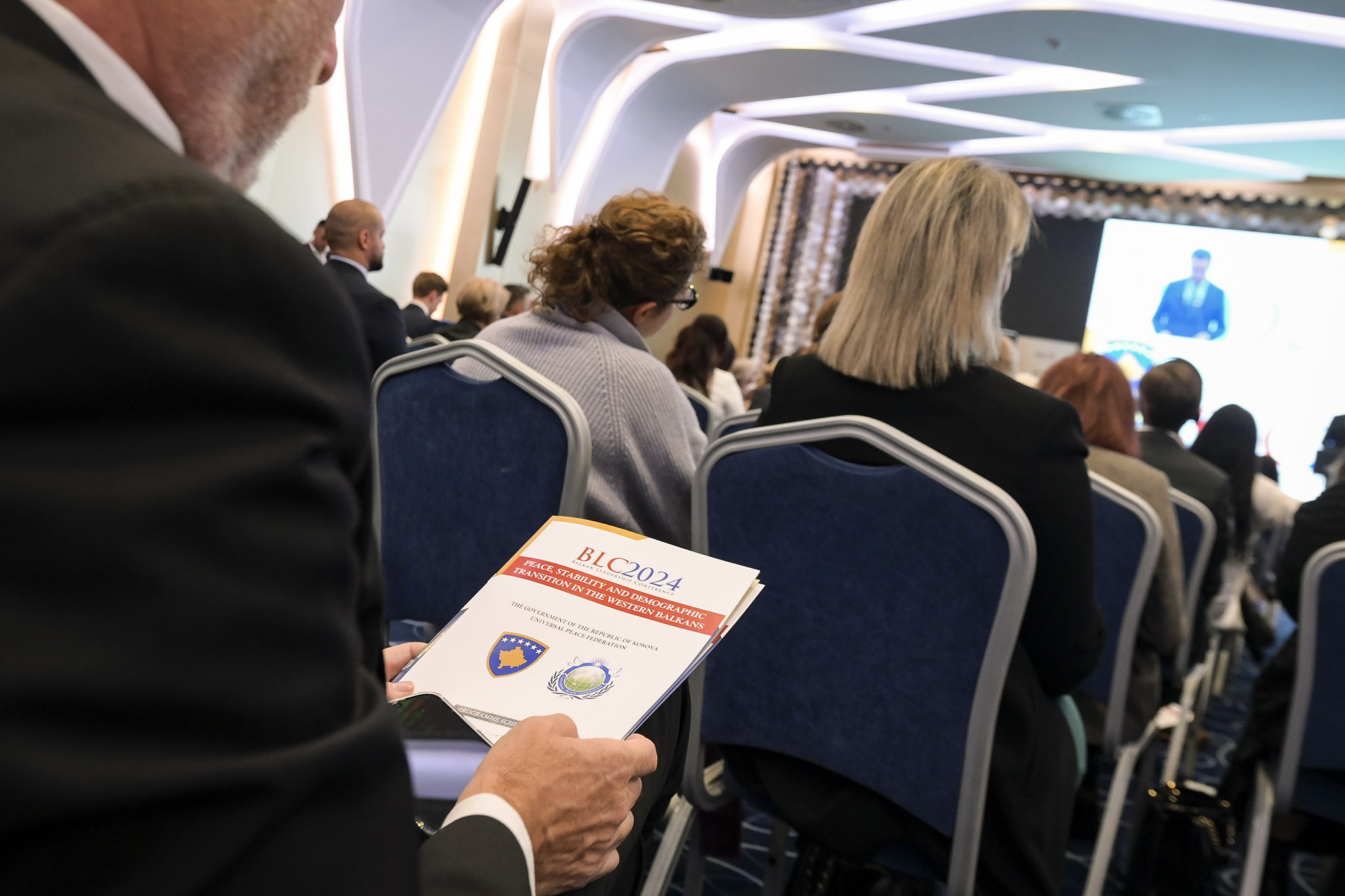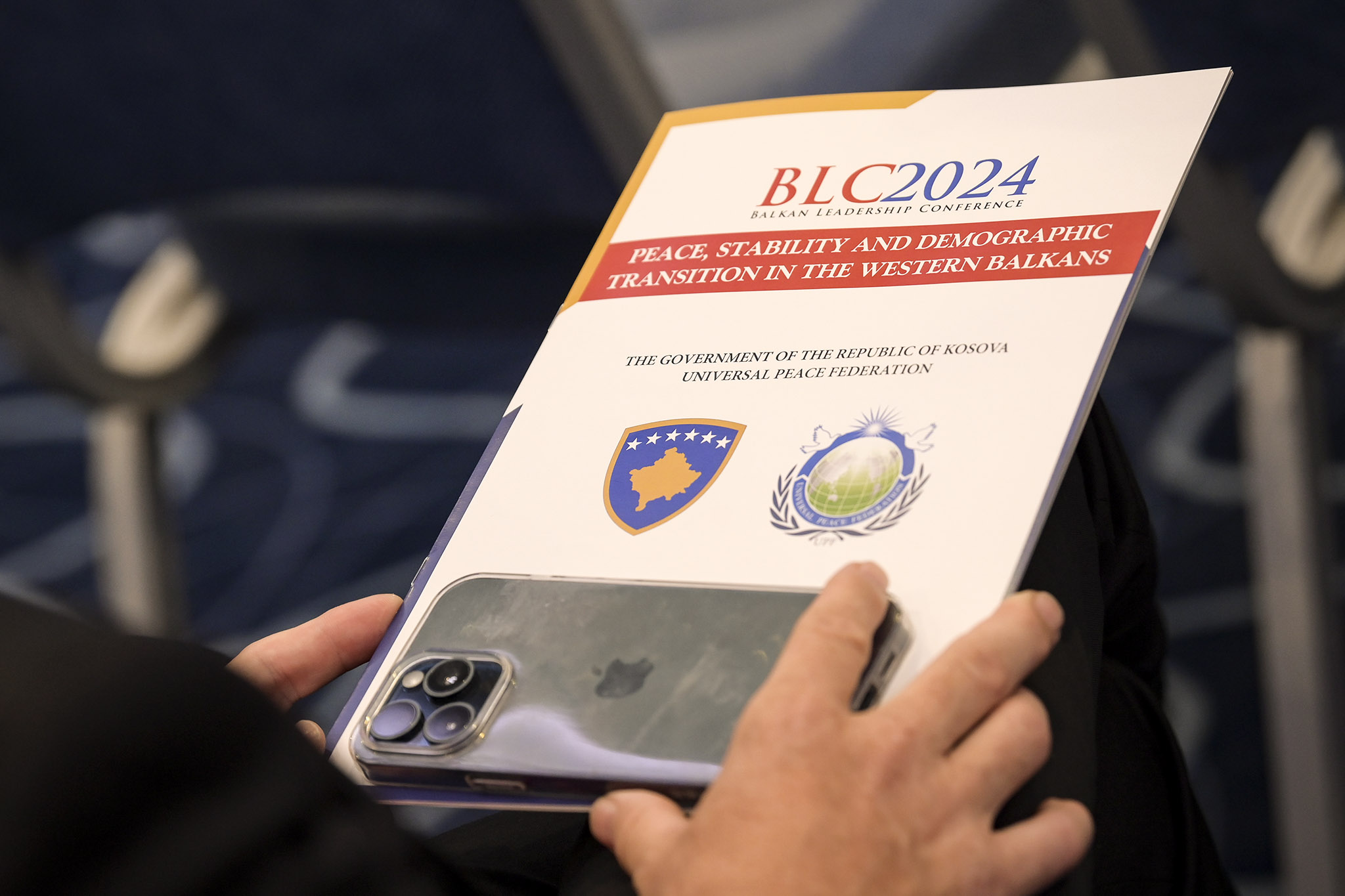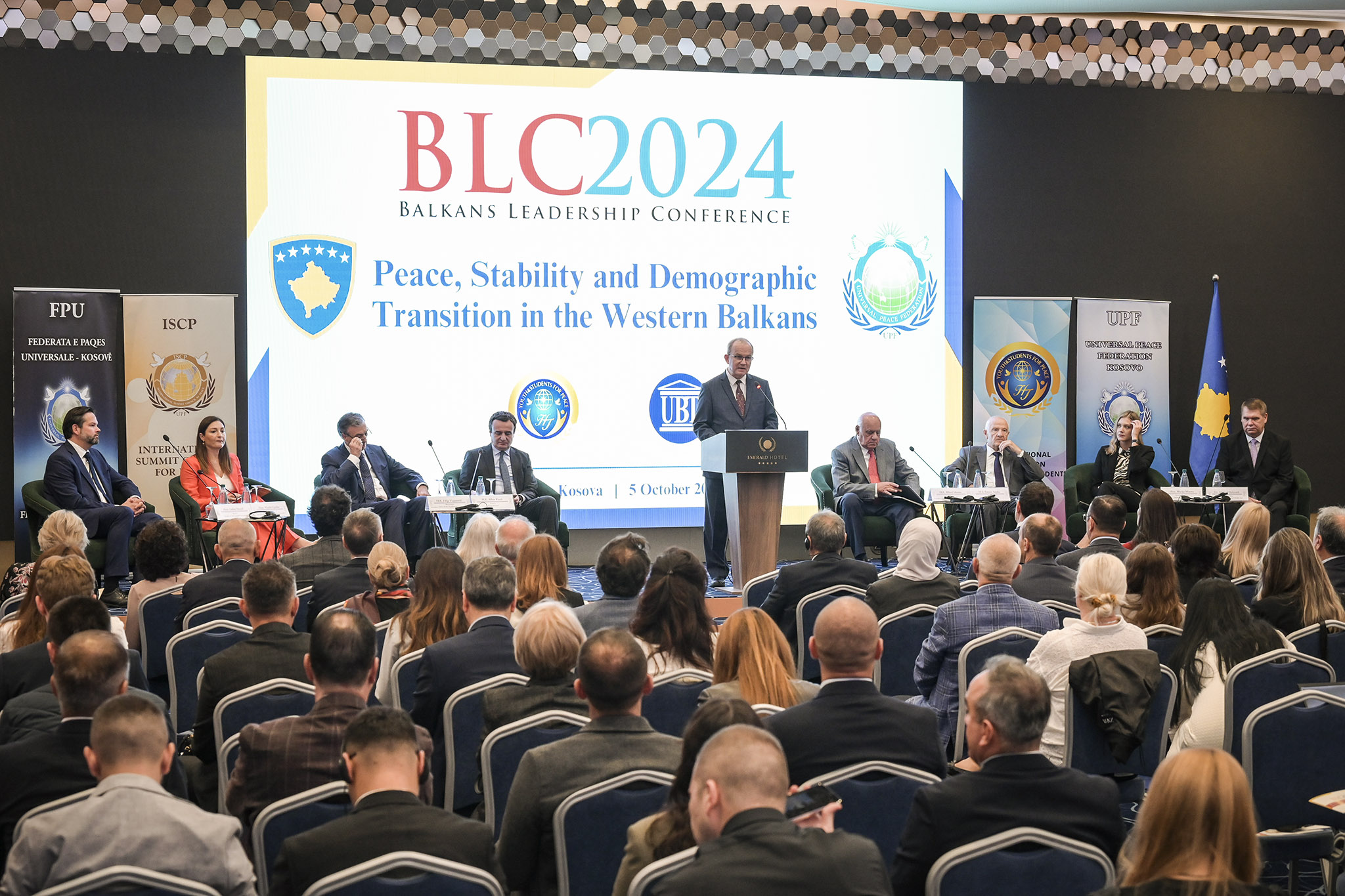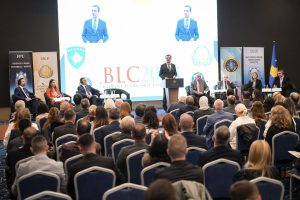Prishtina, 5 October, 2024
The Prime Minister of the Republic of Kosovo, Albin Kurti, participated in the conference organized by the Universal Peace Federation in cooperation with the Government of Kosovo, with the theme: “Peace, stability and demographic transition in the Western Balkans.”
In his introductory speech, Prime Minister Kurti said that peace in our region, and especially in Kosovo, is something that we have never taken for granted, because we had to fight and constantly strive for it.
Prime Minister Kurti addressed the demographic transition, where he said that the waves of emigration as well as the population’s stay in a single country are not as distinct as they were in the last two decades of the 20th century, or even from the beginning of the new century.
“From 2011 until now, there has been a population contraction of 8 percent. At the same time, there are somewhere around 600 thousand members of the diaspora who are believed to live in Kosovo during a significant part of the year, while they are not included in the general population figures”, said the prime minister, adding that this shows that the reality we face offers more flexibility than we had before.
Speaking about the achievements, Prime Minister Kurti said that Kosovo has seen progress like never before in the last three years. “The average economic growth is at the level of 6.2%, the country’s economy, namely the Gross Domestic Product that we are talking about today is six times larger than in 2000”.
The Prime Minister emphasized that there is an increase in employment of over 21% from the 350 thousand jobs that were in Kosovo in the public and private sectors in the spring of 2021 to 425 thousand jobs now that we are talking, including especially the doubling of the number of employed young people and direct support in the employment of over 12 thousand women.
“Thus, we are trying not only to make our beloved Kosovo a place where the youth stay, but also where our compatriots return.”
He ended his speech by emphasizing that the combination of economic and democratic growth, institutional and political stability, closer integration with Western European countries and governmental innovation allows the creation of a new reality, where the opportunity cost is not dramatic in the midst of life here or there in the most developed countries of the world, it is both the solution there and our goal.
Prime Minister Kurti’s complete speech:
Honorable former president of the Republic of Albania, Mr. Alfred Moses,
Honorable, former president of Montenegro, Mr. Filip Vujanovic,
The honorable, former president of the Republic of Kosovo, Mr. Fatmir Sejdiu,
Dear Ms. Klajda Gjosha, former Minister of European Integration of Albania,
Dear Mr. Lukas Mandl, member of the European Parliament,
Dear Ms. Marija Miteva, Member of Parliament in the Republic of North Macedonia,
Dear co-presidents of the Universal Federation for Peace for Europe and the Middle East, Dr. Michael Balcomb and Mr. Jacques Marion,
Dear MPs, members of the government cabinet, former ministers and former MPs,
Dear ambassadors and representatives of friendly countries in the Republic of Kosovo,
Dear attendees,
Ladies and gentlemen,
I have the honor and pleasure to speak here before you today, not only about important topics, but also about the importance of their interconnection: “Peace, stability and demographic transition in the Western Balkans”.
Peace in our region, and especially in Kosovo, is something that we have never taken for granted, because we had to fight and constantly strive for it. With the dangers that are threatening Europe and the Middle East, which will be discussed in the next sessions, the fragility of peace today everywhere in the world is evident. Of course, peace is mainly destabilized from outside, but it is also a work that is done internally.
Here, I do not question the will of a people to build and strengthen peace. Peoples are good and peoples love good. I just returned yesterday from Warsaw, Poland, which I visited for the first time. Among the many impressions left by the Polish capital, it is difficult not to be impressed by the will of the people for reconstruction. By 1944, nearly 85% of the city had been destroyed by the Nazis. The citizens of Warsaw, relying on the paintings of the Venetian Bernardo Bellotto from two centuries ago, rebuilt the city. Now Warsaw is a UNESCO World Heritage Site.
The same will of the people also exists in our country. Kosovo was not only rebuilt physically, but also institutionally. Now our challenge is to find a way to make citizens even more powerful shareholders of our institutional stability: well, of peace and security among us.
Regarding the demographic transition, I believe there are two main factors to consider. The decrease in population as a result of the decrease in the birth rate, which is not only a problem for Europe, but also for the entire world, we would say. According to some projections, by 2050 more than three-quarters of all countries in the world will be below the level of reproduction. This, of course, is the result of a complex decision between personal, economic and social factors. Many governments are trying different methods, such as aid for young families, that is what we tried in Kosovo for the first time, to overcome this challenge.
The waves of emigration as well as the stay of the population in a single country are not as distinct as they were in the last two decades of the 20th century, or even from the beginning of the new century. From 2011 to now, there has been a population decline of eight percent. At the same time, there are somewhere around 600,000 members of the diaspora who are believed to live in Kosovo for a significant part of the year, while not included in the general population figures.
This shows that the reality we face offers more flexibility than we had before. This is due to the increase in remote work, entrepreneurial activities and other reasons that compatriots in the diaspora can be both here and there, and not just either here or there.
Every country – regardless of size or position – faces the fact that another country can offer someone something that its own country cannot offer. But the task and the occasion that is given must be fruitful. It must be developed so that by the time we join the European Union, there will be opportunities for citizens to enjoy the cultural, economic, academic and other aspects of Western European life while still being citizens and long-term residents. in our country.
Kosovo has known progress and progress like never before in these last three years. The average economic growth is at the level of 6.2%, the economy of the country, namely the Gross Domestic Product that we are talking about today is six times larger than in 2000, we are not taking into account the 1999 year of war and the return of refugees to their homes of them burned, and three times bigger than in 2008 when we declared independence.
Exports and foreign investments have doubled and the export-import ratio compared to 2021 has improved to better than 1:6 from 1:9 at that time.
We have an increase in employment of over 21% from the 350 thousand jobs that were in Kosovo in the public and private sectors in the spring of 2021 to 425 thousand jobs now that we are talking, including especially the doubling of the number of young people employed and direct support in the employment of over 12 thousand women. Salaries are on an upward trend, and the minimum wage has doubled in recent years. We have the lowest public debt in Europe, which made us stronger in negotiations with international financial institutions, low level of inflation, while capital expenditures for 2023 were the highest in the history of our country in terms of hundreds of millions executed, meanwhile, the turnover of businesses last year was 58% higher than in 2019, as the year before the pandemic, from 12.5 to 19.76 billion Euros.
Dear attendees,
Our country is growing, as a leader of progress and economic and democratic development in the region and with very promising trajectories for the present and the future.
Thus, we are trying not only to make our beloved Kosovo a place where the youth stay, but also where our compatriots return. My impression is that it is not in the nature of man to spend his whole life living in one place, nor to spend his life speaking only his mother tongue. People are almost made to speak more than one language and live in more than one country. Therefore, it is not a matter of where we go, when we go and why we go, but also when we return, how much we return and why we return.
Visa liberalization allows citizens to be close to Western countries and spend time in countries where they have family, friends, or professional exchange opportunities, but obviously without moving permanently. And exactly as we predicted, visa liberalization for the Republic of Kosovo has not increased migration. On the contrary, there are people who go but regularly and there are more and more people who return. On this occasion, I appeal once again to our emigrants that unlike three decades ago when we told you to contribute by sacrificing, now we tell you to invest to win. They are part of our development and growth and we want to increase and develop this as well.
Economic rapprochement with Europe undoubtedly helps in this. The finalization of negotiations with the EFTA states: Iceland, Liechtenstein, Norway and Switzerland, also creates opportunities to participate in European economic life without moving. Now it is the duty of state innovation to support the diaspora that will participate in the political, economic, professional and cultural life of Kosovo, without having to move here completely. That is, the solution is the best of both worlds. We have the geographical proximity to Western Europe and we need to make it more accessible from a citizen’s personal perspective.
The combination of economic and democratic growth, institutional and political stability, closer integration with Western European countries and governmental innovation that allows the creation of a new reality where the opportunity cost is not dramatic in the middle of life here or there in the most developed countries. developed world, it is both the solution and our goal. As well as the opportunities and options expertly prepared for citizens, which will make them more active participants in society and the state, which in turn strengthens peace, stability and security, undoubtedly present the best response, adaptation to the increasingly dynamic trends of the world.
In reducing the departure from Kosovo, the ever closer connection of education with the economy, of education and professional training with the labor market, of our aim that for every school or faculty diploma there is a job, undoubtedly has an effect. Perhaps the only thing more important in combating migration than the economy and education is the relationship between the economy and education.
Therefore, let me conclude that just as it is important to link peace with stability and the demographic transition in the Western Balkans as the topics we are discussing today, it is equally important to link the economy with education so that our beloved country is more and more livable and livable for everyone, leaving no one behind and especially for the youth.
Thank you!nd Mr. Sejdiu wished the Prime Minister further success in his work, also rejoicing in the fact of the economic progress of Kosovo achieved during the last years.






